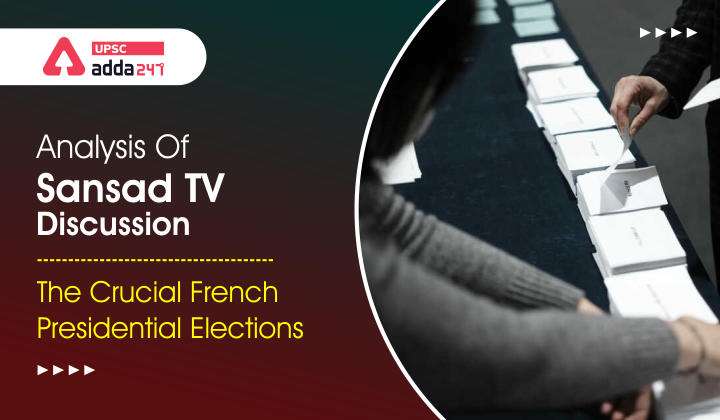Table of Contents
Analysis Of Sansad TV Discussion:
”The Crucial French Presidential Elections”
Relevance
”GS 2: Effect of Policies & Politics of Countries on India’s Interests”
Context
- Emmanuel Macron and Marine Le Pen will face each other in a second round of the French presidential election on April 24, 2022.
- None of the 12 candidates secured more than 50% of the votes in the first round of the presidential election on 10 April.
- Emmanuel Macron attracted 27.84% of the votes cast in the first round. Marine Le Pen scored 23.15%.
Why are these elections Crucial for World?
- It’s the election between a democratic candidate who believes that France’s strength broadens in a powerful and autonomous European Union and an extreme-right candidate who openly sides with those who attack France’s freedom and democracy.
- This election could have seismic implications for not just for people of France but also 450 million citizens of the European Union and governments from Washington to Kyiv.
- A fierce nationalist and Eurosceptic, Le Pen aims to drastically shift France’s place in the European family of nations by ending its senior leadership in NATO, reducing payments and legal deference to the E.U., restricting non-French people’s access to social benefits and advocating a radical rapprochement with Putin.
Who are the top contenders
- Emmanuel Macron(current president) is seen as a centrist, representing the Republic on the Move (En Marche) party and attracting voters from the right and left.
- Marine Le Pen is from the far-right National Rally (Rassemblement National) party.
What are the big issues?
- The war in Ukraine overshadowed early campaigning, but recent opinion polls suggest that the cost of living has become the single most important issue.
- Other big issues are health, security, pensions, the environment and immigration.
- In January, France posted its strongest annual economic growth for half a century, bouncing back from the shock of the Covid-19 pandemic.
- Spiralling energy costs and rising inflation have hit everybody in the pocket, but generally purchasing power is on the rise in France.
- France has seen unemployment fall to 7.4%, just above the average for the eurozone, but close to the target set by the president when he came to power.
Immigration Issue
- On immigration, official statistics suggest that in 2020 there were about 6.8 million immigrants living in France.
- About a third were European, from both European Union and non-EU countries.
Overall, Algerians are the largest foreign community, followed by Moroccans and Portuguese. - Immigration has featured prominently in the campaigns of right-wing candidates.
- Ms Le Pen has proposed a referendum on major reductions in immigration if she becomes president.
Security Issue
- On security, Emanuel Macron has pledged to put thousands more police on the streets, after sharp criticism from Ms Le Pen.
- France has suffered a string of terror attacks in recent years which have strengthened the importance of security for many French voters.
Who can vote?
The President is elected by direct universal suffrage:
-Universal: all French citizens aged 18 and over can vote, whether residing in France or not.
-Direct: votes are directly attributed to the candidates.
Stages in the election
Stage 1: The official list of candidates is published
To officially be a candidate, contenders must, among other things, be nominated by at least 500 elected representatives (e.g. mayors, deputies).
Stage 2: Official electoral campaign
- There is an upper limit on spending which is monitored by a committee.
- Once the official campaign has begun, each candidate must have strictly the same amount of airtime on TV and radio.
Stage 3: 1st round of the election
The French people go to the polls: if no candidate wins over 50% of the vote, a second-round is organized.
Stage 4: 2nd round of the election
- Only the two candidates with the most votes qualify for the 2nd round.
- The candidate with the absolute majority of votes cast is elected.
- Blank or spoilt votes are not taken into account.
Why Second Round?
- The French people go to the polls: if no candidate wins over 50% of the vote, a second-round is organized.
- Only the two candidates with the most votes qualify for the 2nd round.
- The candidate with the absolute majority of votes cast is elected.
- Blank or spoilt votes are not taken into account.



 TSPSC Group 1 Question Paper 2024, Downl...
TSPSC Group 1 Question Paper 2024, Downl...
 TSPSC Group 1 Answer key 2024 Out, Downl...
TSPSC Group 1 Answer key 2024 Out, Downl...
 UPSC Prelims 2024 Question Paper, Downlo...
UPSC Prelims 2024 Question Paper, Downlo...
